CLAS 301B
April 10, 2025
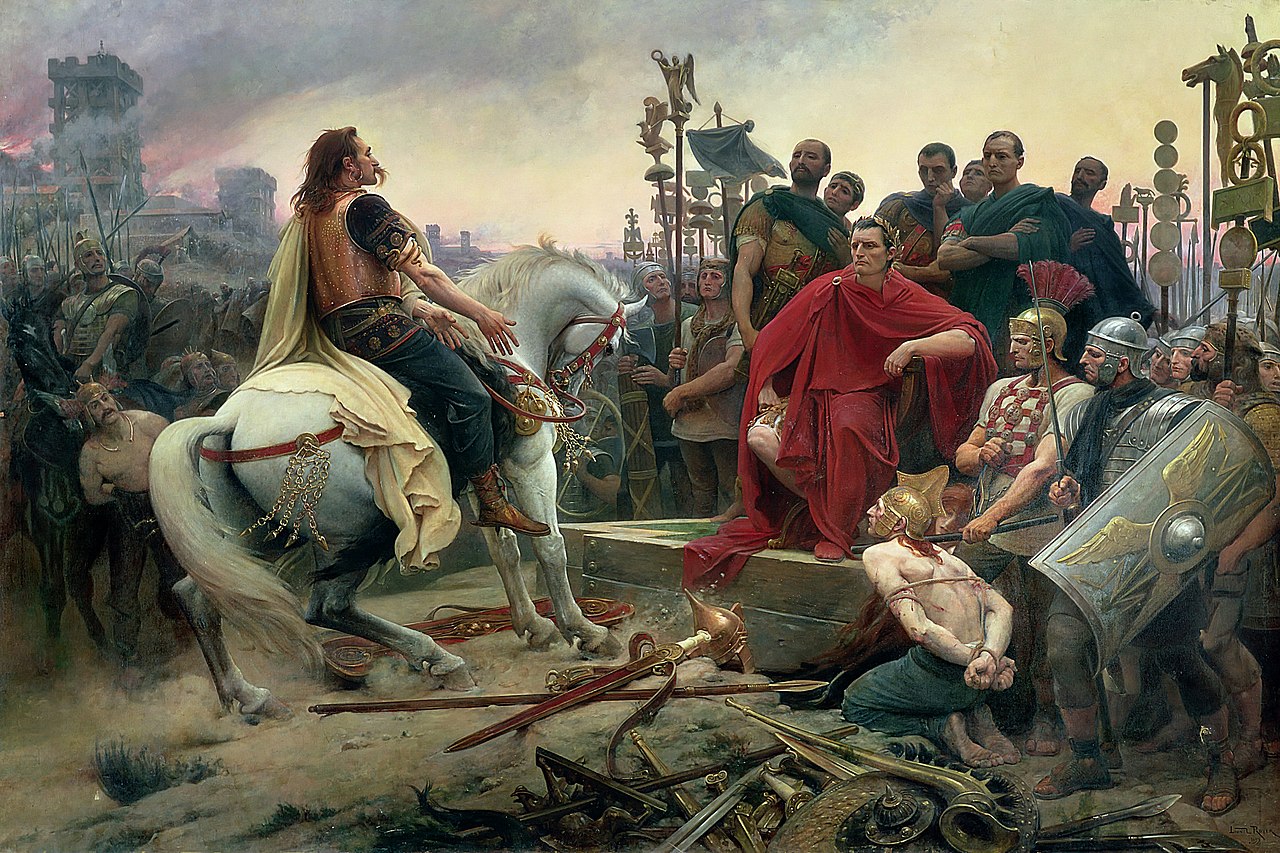
Royer, Vercingetorix Throws Down his Arms at the Feet of Caesar (1899)
Creative Project (due April 15)
Imperial Latin Literature (Early Imperial, Neronian – Lucan, Seneca, Petronius)
- Marcus Annaeus Lucanus (39-65 CE): Cordoba, Spain (39 CE), wealthy, well-connected literary family; Rome & Nero's court (emp. 54-68 CE) as uncle Seneca's protege; Pisonian conspiracy, forced suicide (April 30, 65 CE)
Tacitus, Annals 15.70
[Nero] next ordered the dispatch of Lucan. When his blood was flowing, and he felt his feet and hands chilling and the life receding little by little from the extremities, though his heart retained warmth and sentience, Lucan recalled a passage in his own poem, where he had described a wounded soldier dying a similar form of death, and he recited the very verses.
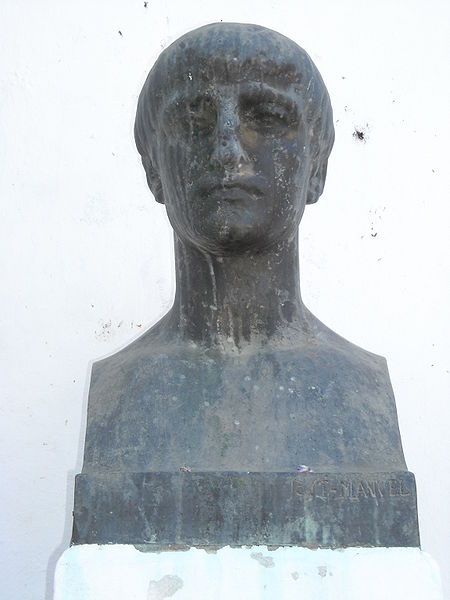
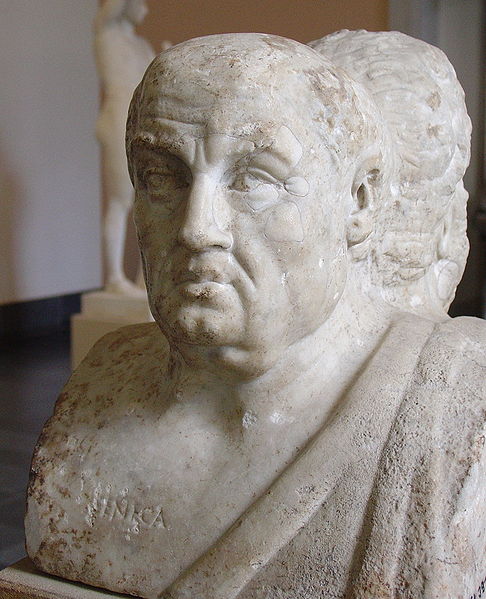
L: Lucan (39-65 CE); R: Seneca (ca. 1 BCE-65 CE)
- Lucan's last years: Civil War's 9.5 books (Walters' translation, Synopsis of books & Glossary); only Bellum Civile aka Pharsalia survives of poetry (". . . our Pharsalia / Will live, not damned to darkness by any age", 9.1011-12); tradition of Roman historical epic, e.g. Naevius' Punic Wars (3rd century BCE), Ennius' Annals (2nd century BCE)
- Julius Caesar (100-44 BCE) vs. Pompey the Great (106-48 BCE) phase (49-45 BCE) of 1st century BCE civil wars > Augustus' principate (illusion of Republic)/monarchy (end of constitutional government) – Julio-Claudian dynasty ends with Nero
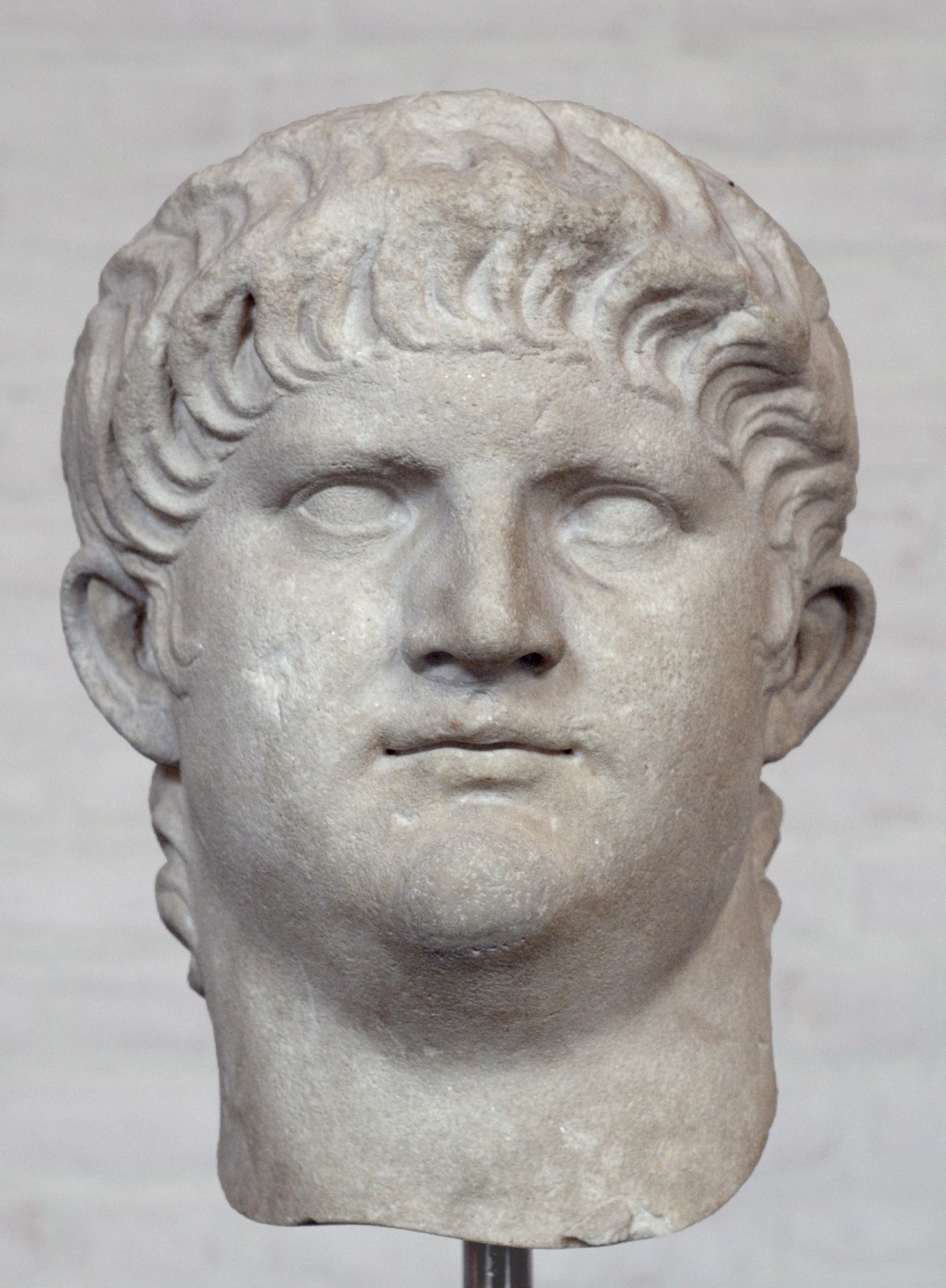
Head of Nero (emperor 54-68 CE)
- Civil War: historical & poeticized memory of events 100+ years before Nero's reign; Lucan's epic hostile toward Caesar(ism) & Rome's lost libertas; nostalgia for lost Republic, esp. elite's lost oligarchy
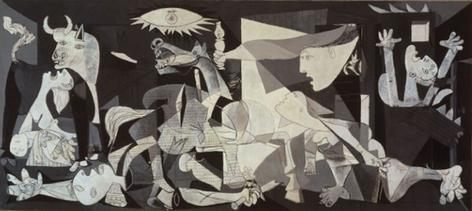
Picasso, Guernica (1937)
- Lucan's epic of horror: overriding theme of civil war as fragmentation of body politic/society; anti-Aeneid rejection of Augustan teleology, anti-national epic/anti-story of Rome's rise to Augustan/imperial greatness & fall into slavery/autocracy (Julius Caesar > Nero)
- Civil War: no epic intervention of gods or divine providence, only supernatural presences (Fate, Fortune), no Muses; military epic but limited heroism
- principal characters– central epic hero?
.jpg)
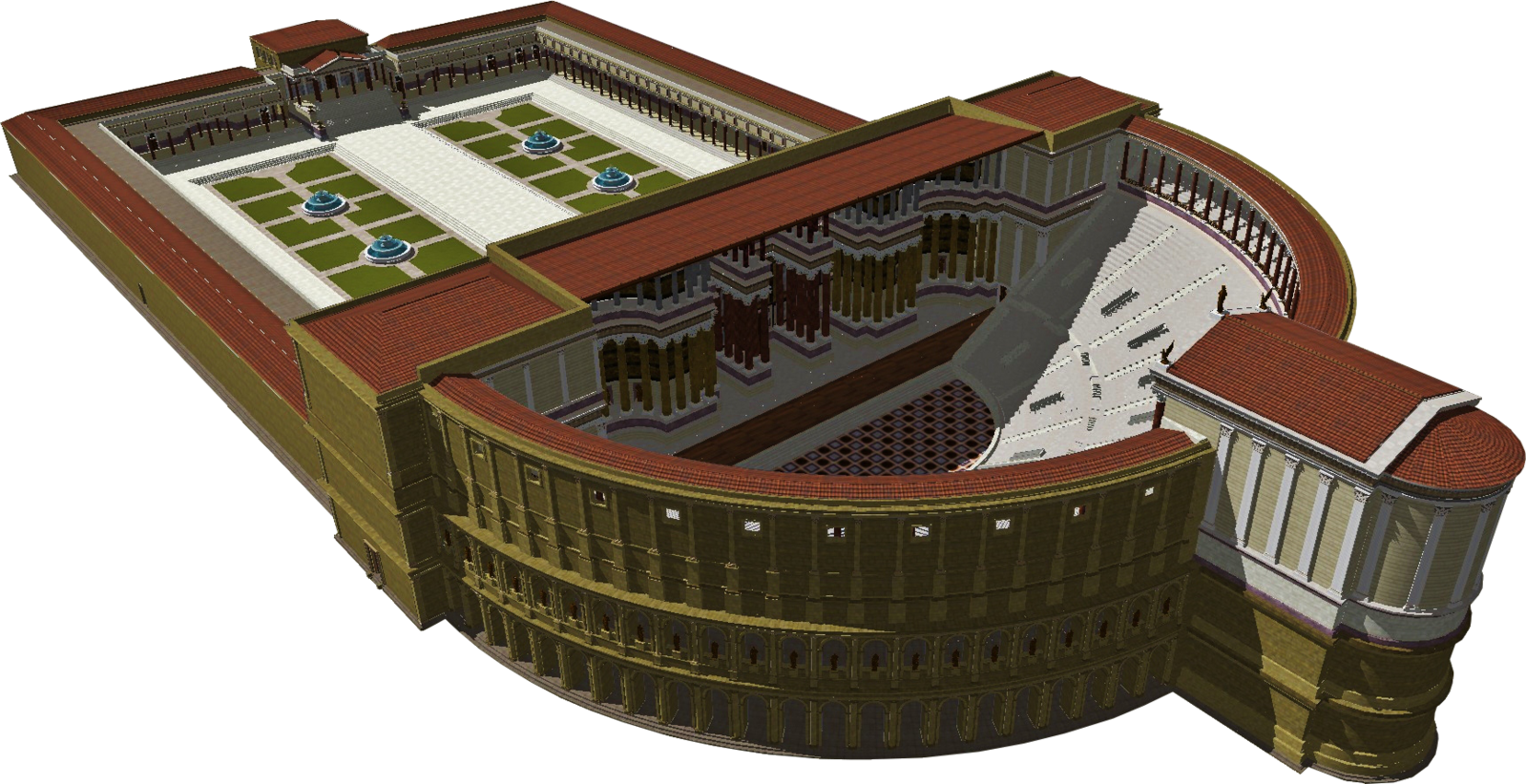
L: Pompey; R: reconstruction of Theater of Pompey (Rome, 55 BCE)
Civil War 1.146-62 READER: Duncan M.
Pompey was old
And in decline, and years of toga-clad peace
Had unmade the general. Hungry for fame
He courted the rabble with constant gifts,
Flitting on the winds of popular favor, basking
In their applause when he entered his theater.
A shadow of his "Great" name,
He stands, like a towering oak in fertile fields
On which old spoils are hung and the dedications
Of long-dead generals. Its roots rotted to nothing
Long ago, only its size now holds it in place,
And though its bare branches spread across the sky,
Its trunk alone casts a shadow, there are no leaves.
Though it totters and almost falls with every breeze,
And many younger trees stand strong all around,
It alone is worshipped.
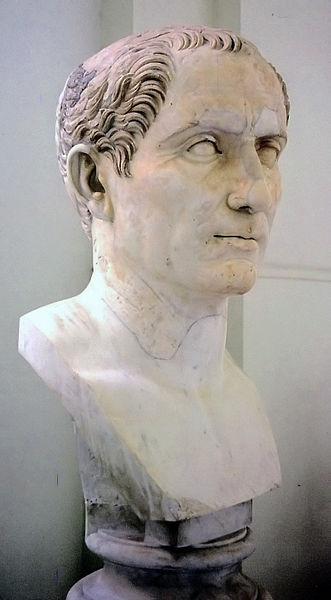

Julius Caesar
Civil War 1.162-75 READER: Duncan M.
Caesar had the name
And fame as a general, plus was possessed
By an energy that couldn't stay still. He was ashamed
To win anything without going to war. Violent,
Uncontrollable—when ambition or anger called,
He turned his hand unsparingly to the sword
And made his advances, pressing Fortune's favor.
Trampling everything
in his way, he rejoices in ruin
Like a lightning-bolt driven by winds through the clouds
Sparks with loud thunder and shatters the heavens
Into daylight. It terrifies the frightened people
And dazzles their eyes with its jagged flame.
It rages
in its precincts, unstoppable, wreaking havoc
Far and wide and gathering its scattered fires.
- Lucan as Vergil's critical reader/Aeneid re-writer
Aeneid 1.1-7 (from Troy's ruins to Augustan Rome)
My song is of war and a man: a refugee by fate,
the first from Troy to Italy's Lavinian shores,
battered much on land and seas by blows from gods
obliging brutal Juno's unforgetting rage;
he suffered much in war as well, all to plant
his town and gods in Latium. From here would rise
the Latin race, the Alban lords, and Rome's high walls.

Civil War 1.1-9 (Lucan's programmatic opening = 7 lines in Latin – self-slaughter, stagnation)
Wars—we sing—worse than civil and waged
Across
Thessalian plains, crimes masquerading as law,
A powerful state disemboweling itself with its own
Victorious right hand, fathers fighting against sons,
And when the tyrannical compact was shattered [so-called "First Triumvirate"; death of Crassus in 53 BCE]
All the strength of the shaken world clashed in battle
That stained us with guilt forever—with standards
Pitched on hated
standards, Eagles matched,
Javelins threatening javelins on either side.
- narrator’s strong personal voice/presence/emotional intensity: apostrophe, hyperbole, paradox, uncertainty & despair; narrative delay (digressions, ekphrases); reluctant narrator of apocalyptic horror
- Lucan's sententiae: clever, pointed, paradoxical & pithy statements for reflection
Civil War 1.141-5 (civil war's inevitability)
Caesar can't brook a superior any more than
Pompey can handle an equal. It's unspeakable
To ask who had the greater right to take up arms:
Each side could claim its own moral authority.
The winners had the gods. But the losers had Cato.
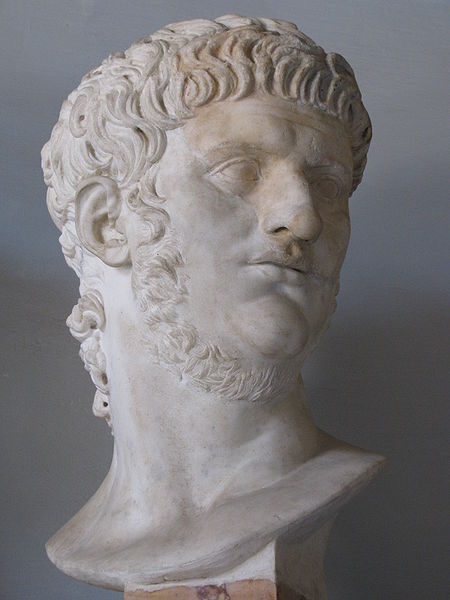
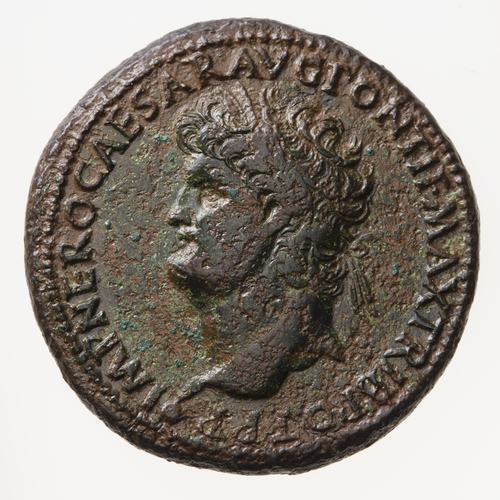
L: head of Nero (ca. 65 CE); R: sesterius depicting Nero (ca. 66 CE)
- required opening panegyric of Nero
Civil War 1.40ff. (ironic Neronian teleology?)
But if the Fates could find no other way
to grant us Nero . . .
. . . Every unmentionable
Crime was worth it . . .
[major battles of civil wars referenced, including Actium]
. . . Rome owes much to civil war,
Caesar, since everything done was for you.
And when your time on earth is over, when at last
You seek the stars, heaven will be glad to have you:
Claim whatever seat you want . . .
[catasterism & apotheosis: cosmic options for Nero]
. . . Every god
Will yield to you. Nature will let you choose
What god to be, and where in the universe you wish
To rule. Just don't set your throne in the Arctic North
or
where the sweltering hinge turns Southern skies:
Your star's vision of Rome will be slanted there.
And if you place your weight down hard on either side
Of the unbound aether, heaven might fold beneath the burden . . . [Nero's gravitas?]
[poet's prayer for world peace watched over by Nero in sky's center]
. . . But you're divine to me already—I'm inspired by you—
I need not move Apollo who stirs Delphi's secrets
Nor bother calling Bacchus away from holy Nysa.
Nero is all I need to give life to Roman song.
Civil War 7.502-7 (humanity's revenge for gods' indifference as battle commences)
No—the gods don't care about mortal affairs!
Yet we'll get our revenge, as much as we can,
Civil war will make emperors equal to gods above,
And Rome will deck out the dead with halos,
Thunderbolts, and stars, and will swear oaths
On Caesars' shades in the temples of the gods.
- outbreak of civil war: Caesar crosses Rubicon (January, 49 BCE), defies anthropomorphic, intervening vision of mourning city-goddess Roma, "To what destruction are you rushing . . . stop now!" (1.213ff.; Caesar's only hesitation in epic (1.216-18), but charges on like a Libyan lion (1.227ff.)
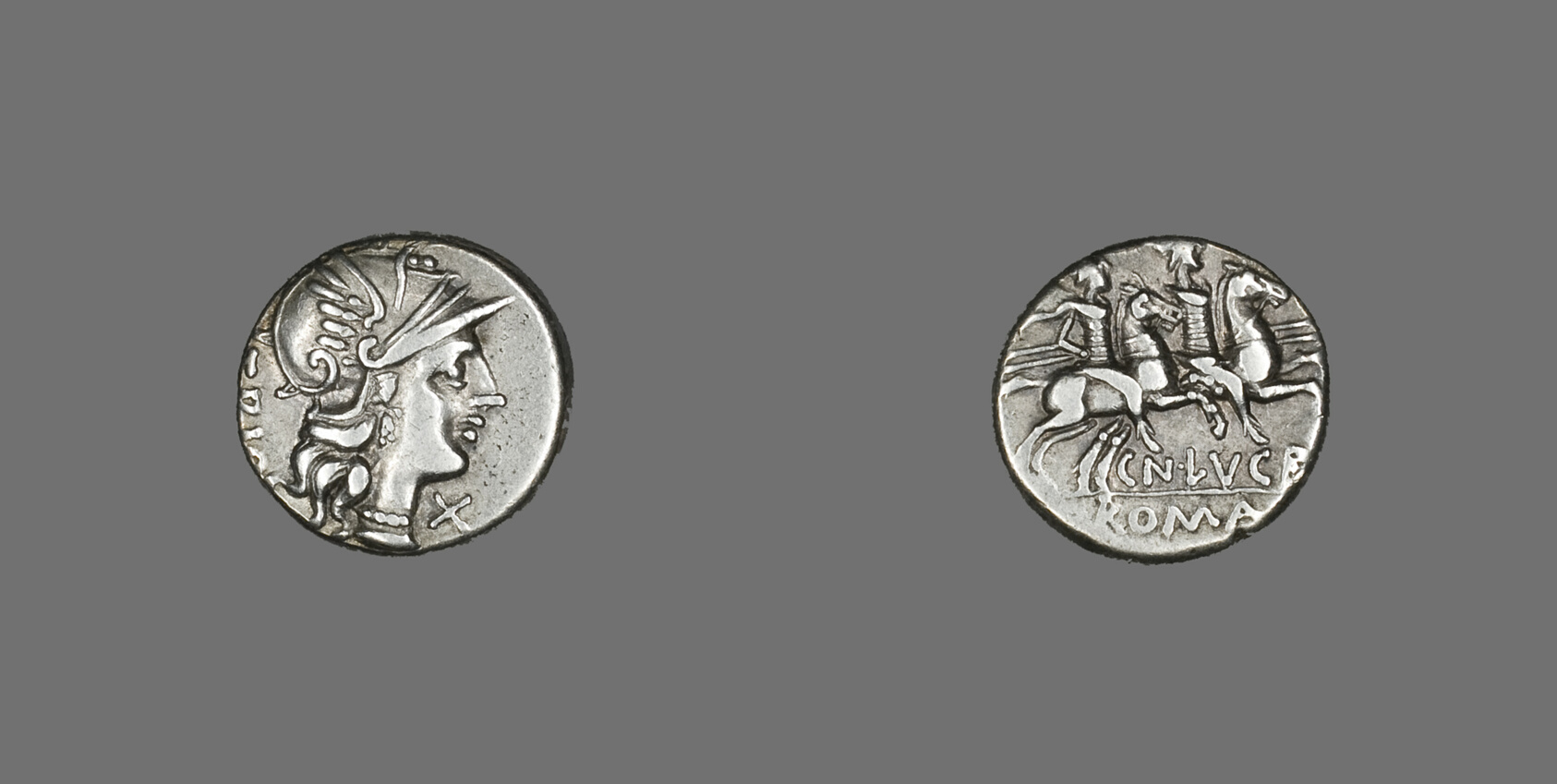
Roma, silver denarius (136 BCE)
Rome (HBO series, 2005-7)
(one of Caesar's soldiers "gets out of line" in Gaul)
https://www.youtube.com/watch?v=-vJTNGH4Ib0
(the Roman Senate debates on Caesar's status and ambitions)
https://www.youtube.com/watch?v=K9ahNR19myM
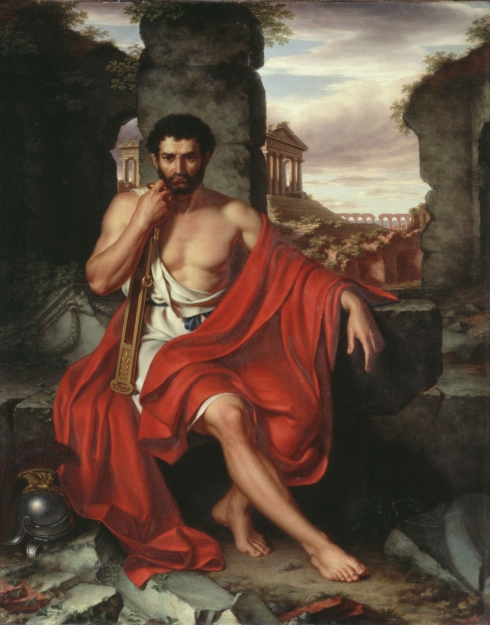
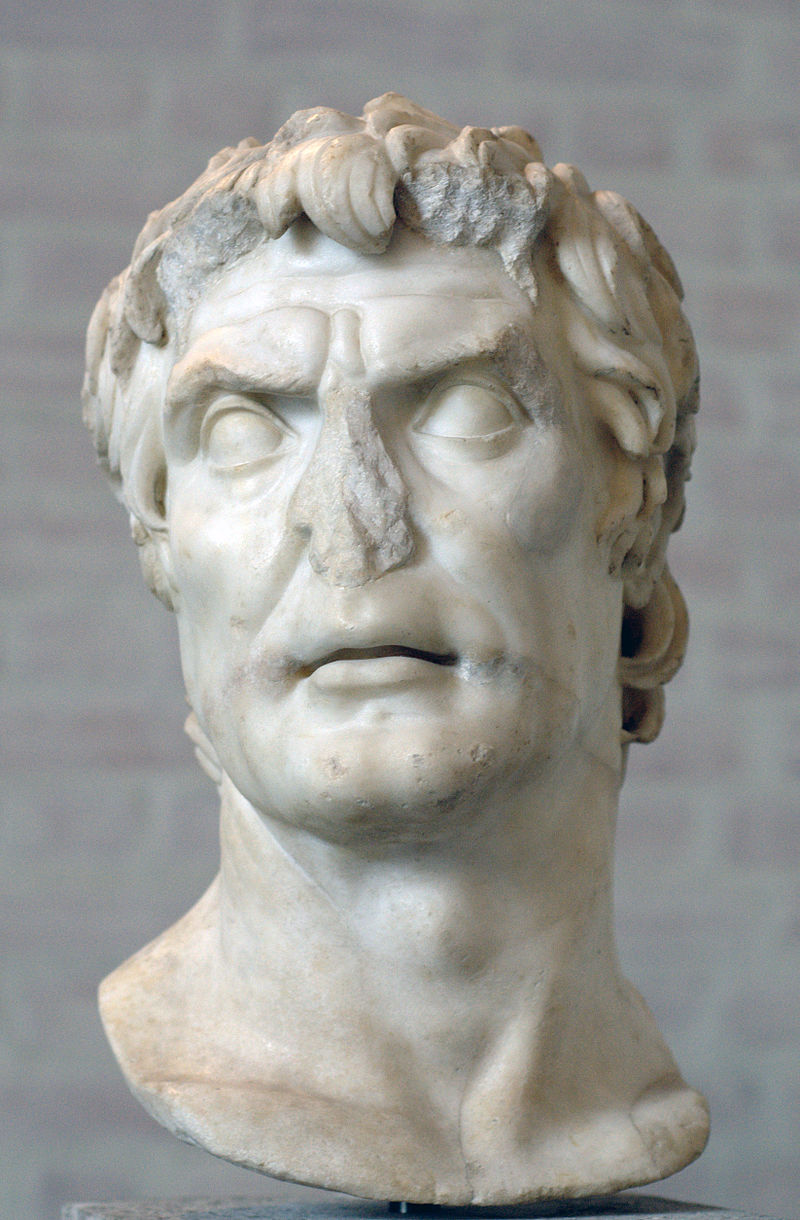
L: Vanderlyn, Marius amid the Ruins of Carthage (1832); R: bust of Sulla (Augustan)
- Civil War 2: bad omens & panic at Rome (simile of mother traumatized at sudden death in family, 2.25ff.); flashback to Marius & Sulla (80s BCE), first strongmen to march on Rome, near-collapse of Republic (Pompey, Sulla's general; Marius, Caesar's uncle)
- speech of old war veteran (2.82ff.): Sulla first to march on Rome, followed by Marius – precedent of proscriptions & horrors of civil war; Roman political world haunted by memory/deep time, history's repeatability, civil war's fragmenting decay
Civil War 2.189ff. (Sulla's "victory" – mutilated body politic)
"After the flesh had started to rot and turn runny
And long time had erased all means of distinction,
Rome's wretched parents came to collect the bits
They recognized and fearfully took them away.
I myself remember wanting to put the decaying face
Of my dead brother on the pyre's forbidden flames.
I wandered through the corpses that Sulla's peace
Had made, picking over the pieces, trying to find
The neck that matched his severed head . . .
. . . Even corpses take part in the killing.
Their headless
trunks smash the living while Sulla
Watches the crime on high, unmoved
For having ordered so many thousands to die . . .
. . . All these horrors await us to suffer again.
And the end of civil strife will be the same.
Yet greater troubles stir me. For I fear mankind
Will lose even more in the coming battle. [Lucan's world war]
The greatest reward of war for the Marian exiles
Lay in retaking Rome. Victory granted
Sulla
Complete destruction of the opposite side.
For these two, Fortune, you have other designs.
They rush to face each other after having power
A long time. Neither
would stir civil war
If content with Sulla's lot."
Thus the old man wept,
Mindful of the past and afraid of the future.

- Cato the Younger (Stoic philosopher & politician, 95-46 BCE): visited by Brutus – how does a Stoic engage in unjust war; Cato considers devotio (2.346-64); reluctant Pompeian ("At least with me in his army / He knows he's not conquering for himself alone", 2.363-4); remarriage with Marcia (Hortensius now dead), the funeral-wedding, "honeymoon"?
Civil War 2.418-22 (severe Roman Stoicism embodied)
This was his character,
This stern Cato's unshakeable creed: To seek the mean
And keep the limit. To obey nature. To devote his life
To country. To think he was born for the sake of the world.
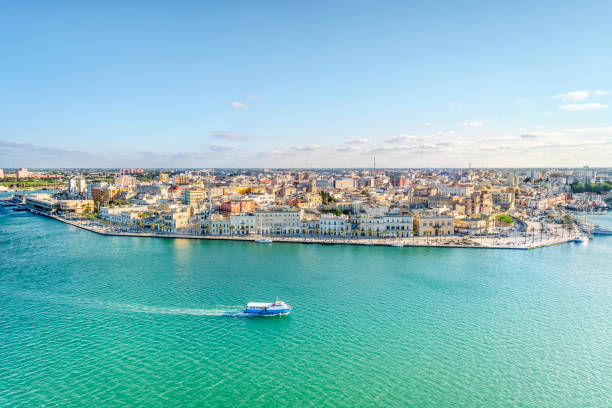
Port of Brundisium (Brindisi) today
- Civil War 3: Pompey’s flight from Brundisium, Italy (Caesar takes army to Spain)
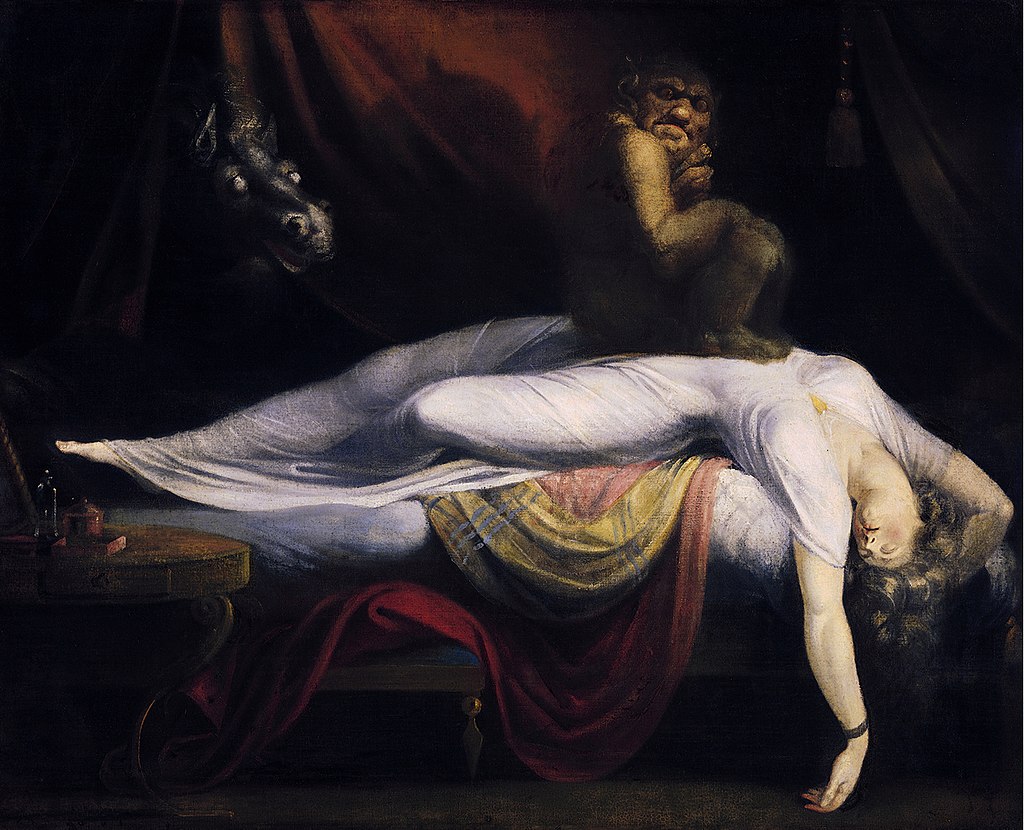
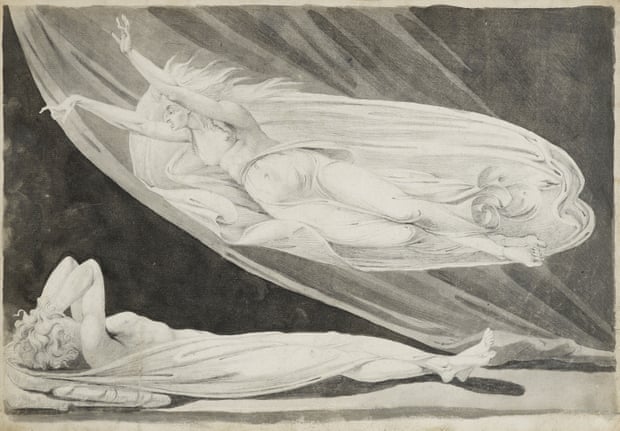
L: Fuseli, The Nightmare (1782); R: Fuseli, Julia Appearing to Pompey in a Dream (1770s)
Civil War 3.19-35 (Julia's ghost appears to Pompey in a dream as he leaves "fallen" Italy – anti-Creusa, end of Aeneid 2)
"Magnus—
When I was your wife, you led such happy triumphs.
But your fortune changed along with your bed:
Cornelia is cursed to drag her husbands forever
Into ruin—that whore beside a warm tomb— [widow of Crassus, Pompey's 5th wife]
Let her hang on your standards for all I care,
And follow you on land and sea, so long as
I'm the one who breaks your troubled dreams, so long
As no time's ever free for you to love. Let Caesar
Hold your days and Julia your nights. Mindless Lethe's
Banks have not erased the memory of my husband,
And the Lords of the Dead have granted me permission
To track you down.
Wherever you wage war
My ghost will follow, stalking through the ranks,
Never letting you forget you're Caesar's son-in-law.
Your sword-arm severs our wedding vows in vain:
For civil war will make you mine."
- Civil War 4-5 summary: fighting shifts to Spain, Illyria, Libya; Caesar finally sets sail for Greece from Brundisium (narrative delay)
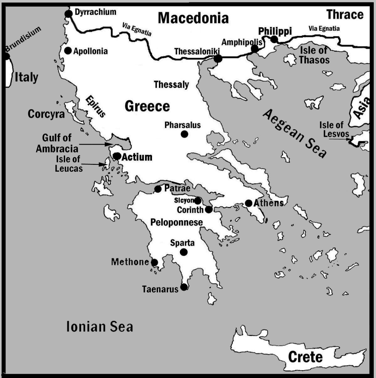
- Civil War 6 (48 BCE) summary: armies battle at Dyrrhachium; Pompey escapes blockade, Caesar & army escape to Thessaly—land of witches, myth & monsters, appropriate venue for civil war/final battle (Pharsalia/Pharsalus)
- Dyrrhachium: raging superhero Scaeva takes on Pompey's army breaking blockade (hyperbolic aristeia), "An army against a single man . . . Nothing guards his naked guts / Except the spears standing fixed in his bones . . . Single handedly / he rushes to receive all of war's many wounds, / Carrying in his breast a dense forest of spears . . ." (6.199ff.)
.png)
- Scaeva exemplary of Caesar's loyalists (Caesar's cult of personality)
Civil War 6.224-34 (Scaeva & the macabre (amphi)theater of war!)
From afar, a Cretan shaft is aimed at Scaeva.
Flying surer than any prayer could hope,
It strikes his head, piercing into his left eyeball.
Snapping muscles and ligaments with the weapon,
He rips the arrow out, his eye still clinging to it,
And tramples both, unflinching, into the ground:
No different, a Pannonian bear, when a Libyan
Has launched his javelin with a little thong,
Wheels in the theater to rage at her wound, attacking
The weapon that struck her, circling after the spear
Stuck in her side.
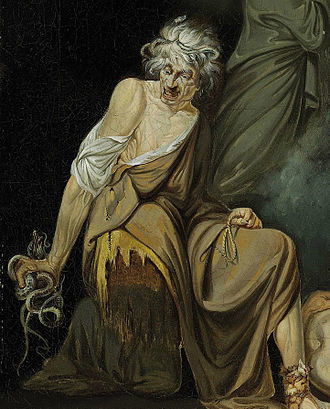
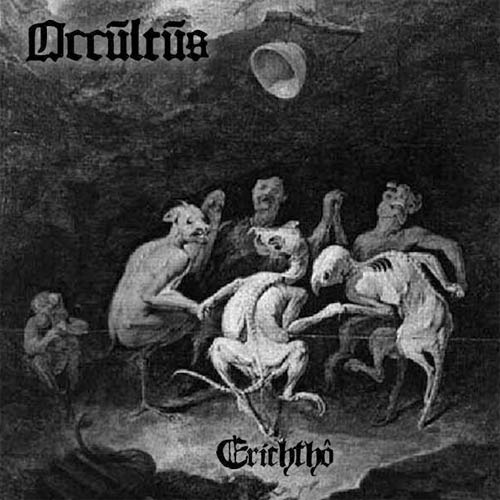
L: Mortimer, Erichtho (ca. 1775); R: Columbian black metal band Occultus' "Erichtho" (cf. Erichtho's voice, "a dissonant murmur of scrambled feedback", 6.721)
- Sextus Pompey: unheroic, motivated by "terror" (6.441), consults toxic & omnipotent Erichtho instead of traditional oracles, augury, astrology – upperworld gods unavailable ("he trusted the mysteries of savage magic . . . the wretch / Clearly saw that Heaven's powers had no clue", 6.452ff.) – cf. Aeneid 6 katabasis
- narrator's lengthy excursus on Thessalian witches & speculation on powers, "Why does heaven / Heed these spells and drugs . . . Are all the gods in thrall to their foul powers?", 6.516ff.)
- death Erichtho's specialty (narrative delay)
Civil War 6.675-88
Dropping down almost to Hell's blind-dark pit,
The earth falls steep away, where pale woods
Hang with drooping leaves, and bent yew tress
Cast thick shadows that Apollo never penetrates.
Inside, withered darkness and decay, bleached pale
from long nights in the cave, are never lighted
Except by magic. And the air is not so stale
Even in the jaws of Taenarus—the grim limit
That divides our world from death's hidden lands,
Whose gloomy edges the Underworld lords don't fear
To let their shades patrol. For though the hag
Can overpower Fate, no one knows whether she sees
Stygian ghosts after dragging them to her cave
Or after going down to Hell itself. [katabasis or forced necromancy?]
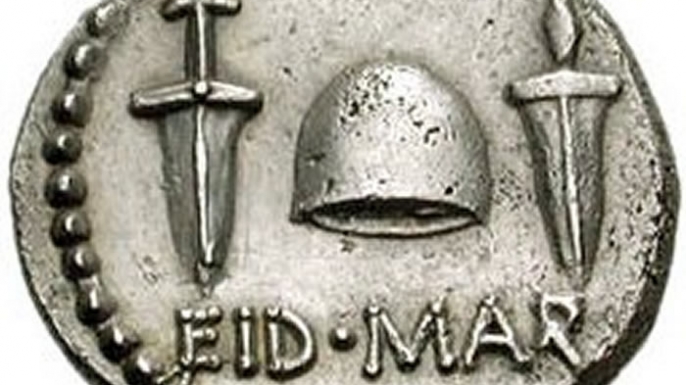
Ides of March silver denarius minted by Brutus, 43/42 BCE
- Erichtho's necromancy: revived corpse's report from underworld (cf. Anchises & parade of Roman souls, Aeneid 6); discord in Hades (conservatives vs. revolutionaries, e.g. Cato the Elder vs. Gracchi), "Among the holy shades, I saw only Brutus / Rejoicing—you, Brutus—Rome's first consul / Once the tyrants were expelled", 6.637-9)
- personal prophecies for Sextus (vs. Roman imperial destiny, etc.)
Civil War 6.849-72 READER: Dan
"And the Stagnant Realm's Lord now throws open
His pale abodes, and sharpens broken stones
And hard steel for shackles, preparing to punish
The victor. But take this comfort with you, boy—
The dead have set aside a quiet realm for your father
And his house, and a space has been made ready
For Pompey's whole line in our land's clear kingdom.
And don't be troubled by this life's short glory.
An hour is coming to level all Rome's warlords.
So rush to meet your death with noble spirits,
Descend from your meager pyre and trample
The ghosts of Rome's gods. Only this is uncertain—
Whose tombs the Nile or the Tiber will touch.
Battle, for the rivals, will only decide their graves.
But don't ask me about your fate, for the Sisters [Fates]
Will make things clear, though I'm silent now,
And your father Pompey will fill you in, [ghost appears to Sextus in lost book?]
A surer prophet in Sicily's fields, still uncertain
Where to summon or expel you, what star's region
To avoid. O wretched men! O doomed house!
Beware of Europe and Libya and Asia! For Fortune
Divides your deaths amid your triumphs,
And in all the world you'll find nothing safer
Than Thessaly's fields!"
- corpse dies again, Sextus & Erichtho return to Pompey's camp at nighttime ("she bid dark night to restrain / The daylight", 6.881-2)





.jpg)












.png)


